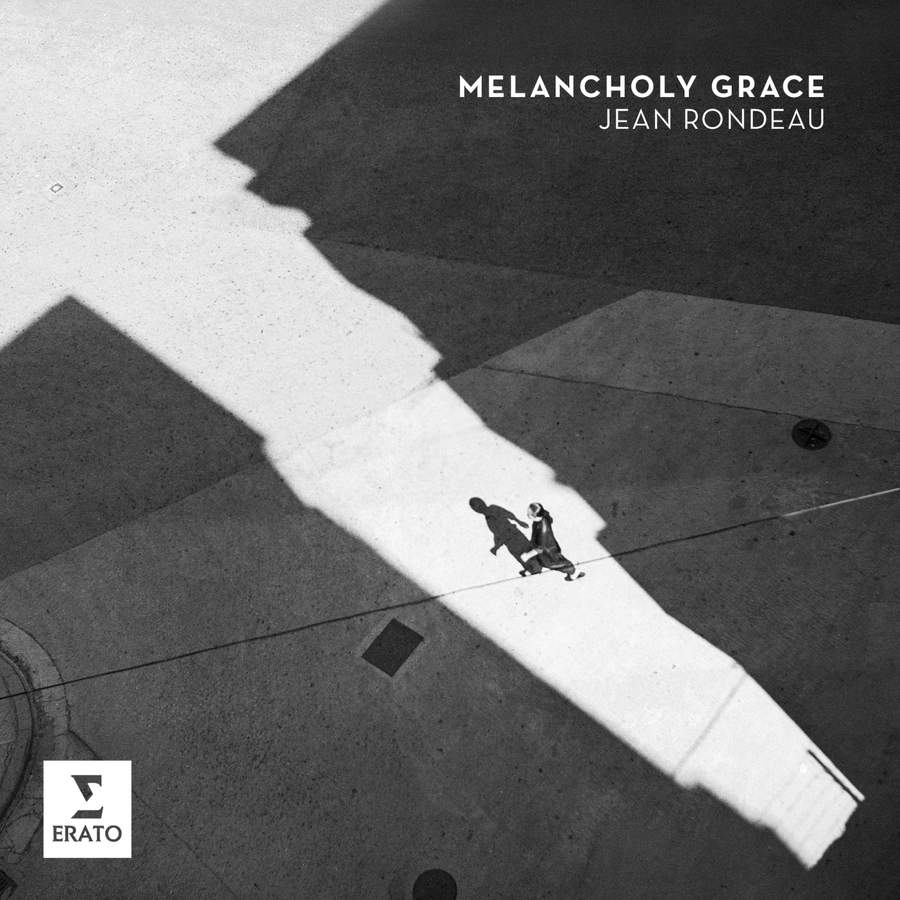Jean Rondeau: Melancholy Grace
View record and artist detailsRecord and Artist Details
Genre:
Instrumental
Label: Erato
Magazine Review Date: 07/2021
Media Format: CD or Download
Media Runtime: 80
Mastering:
DDD
Catalogue Number: 9029 50089-9

Tracks:
| Composition | Artist Credit |
|---|---|
| Toccata Settima |
Girolamo Frescobaldi, Composer
Jean Rondeau, Harpsichord |
| Fantaisie de Mr de Lorency |
Laurencini of Rome, Composer
Jean Rondeau, Harpsichord |
| Passacaille del seigneur Luigi |
Luigi Rossi, Composer
Jean Rondeau, Harpsichord |
| Toccata quarta |
Gregorio Strozzi, Composer
Jean Rondeau, Harpsichord |
| Fantasia Chromatica a 4 |
Jan Pieterszoon Sweelinck, Composer
Jean Rondeau, Harpsichord |
| Ballo alla Polacha |
Giovanni Picchi, Composer
Jean Rondeau, Harpsichord |
| Melancholy Pavan |
John Bull, Composer
Jean Rondeau, Harpsichord |
| Melancoly Galliard |
John Bull, Composer
Jean Rondeau, Harpsichord |
| Pavana lachrymae |
Anonymous, Composer
Jean Rondeau, Harpsichord |
| Toccata del quarto tuono |
Luzzasco Luzzaschi, Composer
Jean Rondeau, Harpsichord |
| Ricercare |
Bernardo Storace, Composer
Jean Rondeau, Harpsichord |
| Toccate e partite d'intavolatura di cimbalo, libro, Movement: Toccatas: |
Girolamo Frescobaldi, Composer
Jean Rondeau, Harpsichord |
| Sortemeplus con alcuni fioretti |
Antonio Valente, Composer
Jean Rondeau, Harpsichord |
| Pavana No 292 |
Orlando Gibbons, Composer
Jean Rondeau, Harpsichord |
| Lachrimae, or Seaven Teares, Movement: Lachrimae Verae |
John Dowland, Composer
Jean Rondeau, Harpsichord |
Author: Mark Seow
In September 1878 Brahms wrote to the conductor Bernhard Scholz: ‘I am coming with a large beard! Prepare your wife for a most awful sight.’ The musicologist Leon Botstein interprets Brahms’s decision not as a fashion statement but more as a signal to Vienna’s liberal elite that he had cast off his youth. This would emerge musically as his Violin Concerto, which premiered in Leipzig on January 1, 1879.
What might Jean Rondeau’s hair tell us about him? On page 19 of the booklet notes, Rondeau is a portrait of structured mess: his hair is simultaneously loose yet controlled, wild yet cultivated – he is a man windswept into civilisation. And in many ways, so is his playing – on both harpsichord and polygonal virginal. Rondeau is a master in creating these structureless structures. Take the Frescobaldi Toccata that opens the disc: we enter in the shadows of timelessness, an improvisation that slowly shapeshifts into dancing counterpoint. It’s enthralling, a listening experience that feels more like a single breath. And as the harpsichord’s resonance retreats into darkened silence, we exhale; there’s a remarkable sense that, though just five minutes of Frescobaldi have passed, we’ve been through an awful lot more.
This sense of breath and space pervades the album, and coming in at over 80 minutes, it’s shed the feeling that it’s a recording at all: Rondeau presents something closer to meditation. The considerable space given over to vibration and resonance between the notes, as well as between some of the tracks, is intriguing. The keyboards then shimmer in this silence. When the polygonal virginal first takes over, its honeyed pluck is wholly unexpected (particularly after the stompy Saltarello by Giovanni Picchi, in which our heads might as well be in the harpsichord among the fabulous rattling and buzzing). In each of these pieces, Rondeau grants us access to little worlds of spiralling wonder, plucked profusion and – wait for it – heart-stopping surprise.
Though some heavy lifting is required of the listener – a level of patience and heightened concentration is demanded to navigate this flow of sound and resonance – we are richly rewarded. Sometimes it feels like a dance between one’s ears and Rondeau’s fingers; there are no bodies, just ears and fingers in love-making sway. By the first of three Ballos by Picchi, we’re fully entrained: our motions are the syncopations and metric deviance; we’ve become the music. It takes a startling amount of intelligence, control, sensitivity and emotional wisdom to make a listener feel this way, feel that they are the music, the story being told. In this regard, Rondeau is a wizard: forget grace, forget melancholy – this is brilliance.
Discover the world's largest classical music catalogue with Presto Music.

Gramophone Digital Club
- Digital Edition
- Digital Archive
- Reviews Database
- Full website access
From £8.75 / month
Subscribe
Gramophone Full Club
- Print Edition
- Digital Edition
- Digital Archive
- Reviews Database
- Full website access
From £11.00 / month
Subscribe
If you are a library, university or other organisation that would be interested in an institutional subscription to Gramophone please click here for further information.




